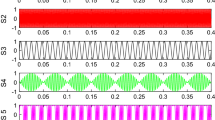Abstract
FastICA and CuBICA are two remarkable independent component analysis algorithms for dealing with blind signal separation problems. In this paper, we first present a novel ICA estimation algorithm, initialization constrained FastICA (IC-FastICA), through combining the technical merits of these two approaches. Then, a performance comparison study on these three approaches is conducted through the simulations on some standard benchmark data. The experimental results demonstrate that the IC-FastICA achieves higher performances on unmixing error and signal noise ratio while appreciably increasing computation cost.
Preview
Unable to display preview. Download preview PDF.
Similar content being viewed by others
References
Hyvarinen, A.: Fast and robust fixed-point algorithms for independent component analysis. IEEE Trans. on Neural Networks 10(3), 626–634 (1999)
Blaschke, T., Wiskott, L.: CuBICA: Independent Component Analysis by Simultaneous Third- and Fourth-Order Cumulant Diagonalization. IEEE Trans. on Signal Processing 52(5), 1250–1256 (2004)
Cichocki, A., Amari, S., Siwek, K., Tanaka, T., et al.: ICALAB Toolboxes, http://www.bsp.brain.riken.jp/ICALAB
ICA 1999 Synthetic Benchmarks, http://sound.media.mit.edu/ica-bench/
Pearlmutter, B.: 16 clips sampled from audio CDs (1996), http://snot.cs.unm.edu/~bap/cICA/clips-wav
Wang, B., Lu, W.: A Fixed-Point Independent Component Analysis with Initialization Constraint. In: The Third International Conference on Communications, Circuits and Systems (ICCCAS 2005) (2005)
Author information
Authors and Affiliations
Editor information
Editors and Affiliations
Rights and permissions
Copyright information
© 2005 Springer-Verlag Berlin Heidelberg
About this paper
Cite this paper
Wang, B., Lu, W. (2005). An In-depth Comparasion on FastICA, CuBICA and IC-FastICA. In: Wang, L., Chen, K., Ong, Y.S. (eds) Advances in Natural Computation. ICNC 2005. Lecture Notes in Computer Science, vol 3611. Springer, Berlin, Heidelberg. https://doi.org/10.1007/11539117_60
Download citation
DOI: https://doi.org/10.1007/11539117_60
Publisher Name: Springer, Berlin, Heidelberg
Print ISBN: 978-3-540-28325-6
Online ISBN: 978-3-540-31858-3
eBook Packages: Computer ScienceComputer Science (R0)




